最新牛津译林七年级预备课程 starter知识点及相关练习
Starter_Unit1-Unit4_知识点总结

Starter Unit1-Unit4 知识点总结1.问候用语Good morning/afternoon/evening!早上好/下午好/晚上好!Good night!晚安!(晚上告别语)—How are you? 你(身体)好吗?—I’m fine/very well/ OK, thanks. How are you? / And you? 我很好,谢谢。
你呢?—I’m fine/OK, too. 我也很好。
注意:若问家人身体怎么样:How +be+家人?2.询问某物用英语怎么说—What’s this/that in English?—It’s a/an…+单数物品. (不用this/that回答,用人称代词it回答。
)be 动词作谓语动词的特殊疑问句:特殊疑问词+be动词(注意人称单复数)+主语+句子其余部分? 具体回答(人称代词):主语+be+句子其余部分.名词单数不要忘记a/anbe动词用法口诀我用am,你用are,is连着他/她/它,单数名词用is,复数名词全用are,1 / 5变否定,更容易,(be)后加not就可以,变问句,往前提,句末问号莫忘记。
指示代词:this/ that/these/thosethis:近指,作主语,谓语动词用单数形式。
that:远指,作主语,谓语动词用单数形式。
these:近指,作主语,谓语动词用复数形式。
those:远指,作主语,谓语动词用复数形式。
冠词a/an/thea和an是不定冠词,只用在可数名词单数前面,表示“一”。
a用在以辅音音素开头的单词前;an 用在以元音音素开头的单词前。
如:a pen /pen/ 一支钢笔(/p/为辅音音素)an orange /'ɔrɪndʒ/ 一个桔子(/ɒ /为元音音素)the是定冠词,表示“这(个),那(个),这些,那些”,在元音音素前读/ði:/,在辅音音素前读/ðə/。
它可以用在名词前,表示特指说话双方都知道的人或物,或上文提到的人或物。
牛津译林预备版七上辅导材料Starter Unit 5

七年级英语辅导材料Starter Unit 5 知识点1.wonderful things非常好的物品2.bring …to … 带来bring their schoolbags to school带他们的书包来学校3.all of the students = all the students所有的学生4.like doing sth 喜欢做某事like drawing/playing football/reading喜欢画画/踢足球/读书like reading stories/storybooks喜欢读书/读故事/读故事书5.football cards足球卡片6.tell the right time告诉正确的时间7. a box of crayons一盒蜡笔8.It’s not fast or slow.它既不快也不慢。
9.We all have books.= All of us have books.我们都有书。
10.What time is it? = What is the time?现在几点钟?11.It’s raining.天正在下雨。
12.I have an umbrella.→ Do you have an umbrella?Yes, I do./ No, I don’t.Sorry, I don’t have an umbrella, but he has one.13.She has an umbrella.→ Does she have an umbrella?Yes, she does. No, she doesn’t.14.I can go home with her.我可以和她一起回家。
15.over there在那边16.fly kites放风筝17.Let’s go and play with them.让我们去和他们一起玩。
18.The boy has a toy car.= There is a toy car in the boy’s hand.这个男孩有一个玩具汽车。
译林版七年级预备篇Starter Lesson 1 Nice to meet you
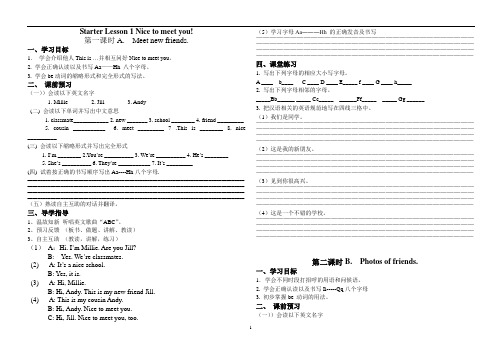
Starter Lesson 1 Nice to meet you!第一课时A. Meet new friends.一、学习目标1.学会介绍他人This is …并相互问好Nice to meet you。
2. 学会正确认读以及书写Aa——Hh 八个字母。
3. 学会be动词的缩略形式和完全形式的写法。
二、课前预习(一))会读以下英文名字1. Millie2. Jill3. Andy(二) 会读以下单词并写出中文意思1. classmate____________2. new _______3. school ________4. friend _________5. cousin ___________6. meet _________ 7 .This is ________ 8. nice __________(三) 会读以下缩略形式并写出完全形式1. I’m ________2.You’re __________3. We’re __________4. He’s ________5. She’s __________6. They’re ___________7. It’s _________(四) 试着按正确的书写顺序写出Aa----Hh八个字母._____________________________________________________________________________________ _____________________________________________________________________________________ _____________________________________________________________________________________ _____________________________________________________________________________________ (五)熟读自主互助的对话并翻译。
译林版 预备课程 Starter Lesson 6
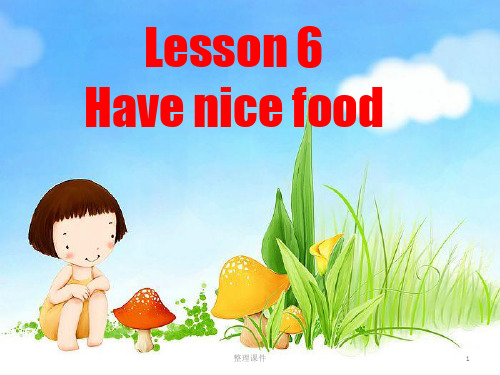
整理课件
2
•lead-in
food
vegetables
整理课件fruit drinks 3
cake 蛋糕
cakes
I want to have a birthday cake.
我想要一个生日蛋糕
整理课件
4
egg 鸡蛋
eggs
Eg. I like eggs.
整理课件
5
apple 苹果
apples
1. 明天是我13岁的生日。 It’s _____ 13th _____ _____.
2. 让我们去超市买些蔬菜吧。 _____ _____some _______ in the supermarket.
3. 我想和你一起打篮球。 I _____ _____ _____basketball with you.
An apple a day keeps the doctor away. 一天一苹果,医生远离我。
整理课件6ຫໍສະໝຸດ orange 橘子oranges
My favourite fruit is orange. 我最喜欢的水果是橘子。
整理课件
7
banana 香蕉
bananas
整理课件
8
potato 土豆
an egg
eggs
a potato
potatoes
a tomato tomatoes
整理课件
32
What else do our parents cook for birthday?
bread rice fish
noodles vegetables
chicken
soup
整理课件
33
牛津译林预备版七上Starter课时作业StarterL2(2)
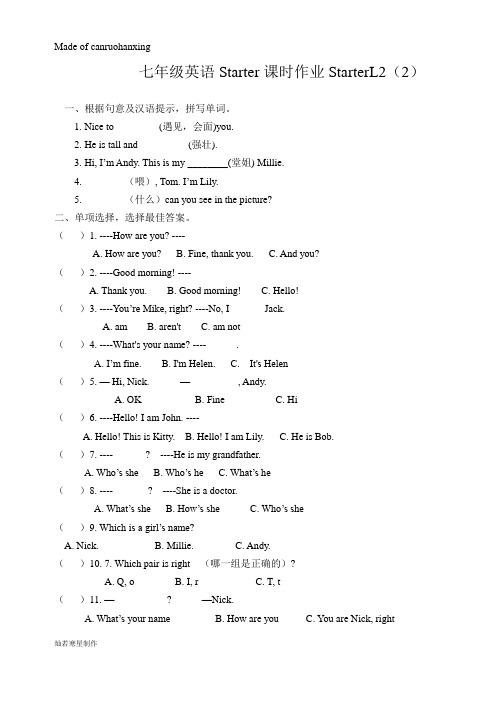
七年级英语Starter课时作业StarterL2(2)一、根据句意及汉语提示,拼写单词。
1. Nice to _______(遇见,会面)you.2. He is tall and ________(强壮).3. Hi, I’m Andy. This is my ________(堂姐) Millie.4. ________(喂), Tom. I’m Lily.5. ________(什么)can you see in the picture?二、单项选择,选择最佳答案。
()1. ----How are you? ----______A. How are you?B. Fine, thank you.C. And you?()2. ----Good morning! ----______A. Thank you.B. Good morning!C. Hello!()3. ----You’re Mike, right? ----No, I ______ Jack.A. amB. aren'tC. am not()4. ----What's your name? ----______.A. I’m fine.B. I'm Helen.C. It's Helen()5. — Hi, Nick. — _________, Andy.A. OKB. FineC. Hi()6. ----Hello! I am John. ----______A. Hello! This is Kitty.B. Hello! I am Lily.C. He is Bob.()7. ---- ______? ----He is my grandfather.A. Who’s sheB. Who’s heC. What’s he()8. ----_______? ----She is a doctor.A. What’s sheB. How’s sheC. Who’s she()9. Which is a girl’s name?_______A. Nick.B. Millie.C. Andy.()10. 7. Which pair is right (哪一组是正确的)?A. Q, oB. I, rC. T, t()11. — __________? —Nick.A. What’s your nameB. How are youC. You are Nick, right三、情景交际。
七年级上册英语预备单元Starter units1-3知识点归纳及练习(带答案)
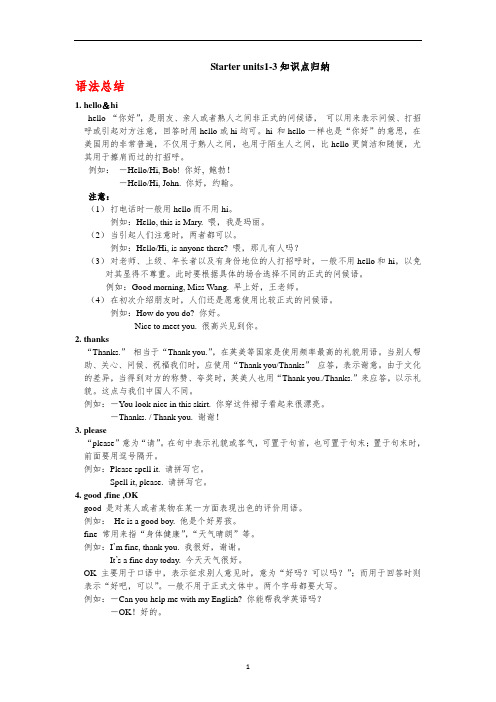
Starter units1-3知识点归纳语法总结1. hello&hihello “你好”,是朋友、亲人或者熟人之间非正式的问候语,可以用来表示问候、打招呼或引起对方注意,回答时用hello或hi均可。
hi 和hello一样也是“你好”的意思,在美国用的非常普遍,不仅用于熟人之间,也用于陌生人之间,比hello更简洁和随便,尤其用于擦肩而过的打招呼。
例如:-Hello/Hi, Bob! 你好, 鲍勃!-Hello/Hi, John. 你好,约翰。
注意:(1)打电话时一般用hello而不用hi。
例如:Hello, this is Mary. 喂,我是玛丽。
(2)当引起人们注意时,两者都可以。
例如:Hello/Hi, is anyone there? 喂,那儿有人吗?(3)对老师、上级、年长者以及有身份地位的人打招呼时,一般不用hello和hi,以免对其显得不尊重。
此时要根据具体的场合选择不同的正式的问候语。
例如:Good morning, Miss Wang. 早上好,王老师。
(4)在初次介绍朋友时,人们还是愿意使用比较正式的问候语。
例如:How do you do? 你好。
Nice to meet you. 很高兴见到你。
2. thanks“Thanks.”相当于“Thank you.”,在英美等国家是使用频率最高的礼貌用语。
当别人帮助、关心、问候、祝福我们时,应使用“Thank you/Thanks”应答,表示谢意。
由于文化的差异,当得到对方的称赞、夸奖时,英美人也用“Thank you./Thanks.”来应答,以示礼貌。
这点与我们中国人不同。
例如:-You look nice in this skirt. 你穿这件裙子看起来很漂亮。
-Thanks. / Thank you. 谢谢!3. please“please”意为“请”。
在句中表示礼貌或客气,可置于句首,也可置于句末;置于句末时,前面要用逗号隔开。
译林版牛津初中英语-Starter(预备教程)-词汇表.
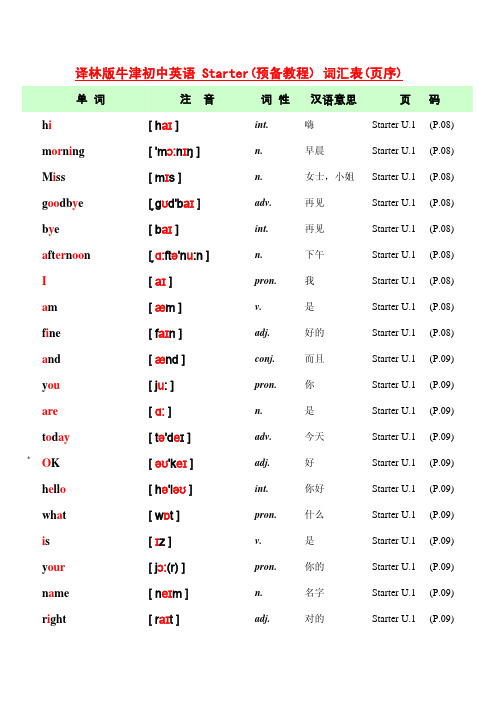
译林版牛津初中英语 Starter(预备教程) 词汇表(页序)单词注 音 词 性 汉语意思 页 码h i[ h aɪ ] int. 嗨 Starter U.1 (P.08)m or n i ng [ 'mɔ:nɪŋ ] n. 早晨 Starter U.1 (P.08) M i ss [ mɪs ] n. 女士,小姐 Starter U.1 (P.08)g oo db y e [ ̗ɡʊd'b aɪ ] adv. 再见 Starter U.1 (P.08)b y e [ b aɪ] int. 再见 Starter U.1 (P.08)a ft er n oo n[ ̗ɑ:ftə'n u:n] n. 下午 Starter U.1 (P.08)I [ aɪ] pron. 我 Starter U.1 (P.08)a m[ æm] v. 是 Starter U.1 (P.08)f i ne [ f aɪn] adj. 好的 Starter U.1 (P.08)a nd[ ænd] conj. 而且 Starter U.1 (P.09)y ou[ j u:] pron. 你 Starter U.1 (P.09) are [ ɑ:] n. 是 Starter U.1 (P.09) t o d ay[ tə'd eɪ] adv. 今天 Starter U.1 (P.09) *O K[ əʊ'k eɪ] adj. 好 Starter U.1 (P.09)h e ll o[ hə'ləʊ ] int. 你好 Starter U.1 (P.09)wh a t [ wɒt] pron. 什么 Starter U.1 (P.09)i s[ ɪz] v. 是 Starter U.1 (P.09)y our[ jɔ:(r)] pron. 你的 Starter U.1 (P.09) n a me [ n eɪm] n. 名字 Starter U.1 (P.09) r i ght [ r aɪt] adj. 对的 Starter U.1 (P.09)y e s [ j e s] adv. 是的 Starter U.1 (P.09) n o[ nəʊ] adv. 没有 Starter U.1 (P.09) Mrs [ 'mɪsɪz] n. 夫人 Starter U.1 (P.09) th i s [ ðɪs] pron. 这 Starter U.2 (P.12) sh e[ ʃi:; ʃɪ] pron. 她 Starter U.2 (P.12) m y[ m aɪ] pron. 我的 Starter U.2 (P.12) s i st er[ 'sɪstə] n. 姐妹 Starter U.2 (P.12)h e[ hɪ; h i:] pron. 他 Starter U.2 (P.12) *tw i n [ twɪn ] n. 双胞胎 Starter U.2 (P.12) br o th er[ 'brʌðə(r)] n. 兄弟 Starter U.2 (P.12)d o g [ dɒɡ] n. 狗 Starter U.2 (P.12)c a t [ 'kæt] n. 猫 Starter U.2 (P.12)gr a ndf a th er[ 'ɡrænfɑ:ðə(r) ] n. 祖父 Starter U.2 (P.12) gr a ndm o th er[ 'ɡrænmʌðə(r)] n. 祖母 Starter U.2 (P.12)f a th er[ 'fɑ:ðə(r)] n. 父亲 Starter U.2 (P.12)m o th er[ 'mʌðə(r)] n. 母亲 Starter U.2 (P.12) n o t [ nɒt] adv. 不 Starter U.2 (P.12)i t[ ɪt] pron. 它 Starter U.2 (P.13)a(a n)[ eɪ; ə] art. 一 Starter U.2 (P.13) ph o t o[ 'fəʊtəʊ] n. 照片 Starter U.2 (P.13) o f[ əv; ɒv] prep. …的 Starter U.2 (P.13)f a m i l y[ 'fæməlɪ] n. 家庭 Starter U.2 (P.13)wh o[ h u:] pron. 谁 Starter U.2 (P.13) au nt[ ɑ:nt] n. 伯母 Starter U.2 (P.13) u ncle[ 'ʌŋkl] n. 叔父 Starter U.2 (P.13)c ou s i n [ 'kʌzn] n. 堂兄弟姊妹 Starter U.2 (P.13)d o ct or[ 'dɒktə] n. 医生 Starter U.2 (P.14)t ea ch er[ 'ti:ʧə ] n. 老师 Starter U.2 (P.14) p o l i c e m a n [ pə'l i:smən] n. 警察 Starter U.2 (P.14) n ur se [ nɜ:s] n. 护士 Starter U.2 (P.14) m a n [ mæn] n. 男人 Starter U.2 (P.14) w o m a n [ 'wʊmən] n. 女人 Starter U.2 (P.14) th a t [ ðæt] pron. 那个 Starter U.2 (P.14) dr i v er[ 'dr aɪvə] n. 驾驶员 Starter U.2 (P.15) w or k er[ 'wɜ:kə] n. 工人 Starter U.2 (P.15) j o b [ ʤɒb] n. 工作 Starter U.2 (P.15) w e[ wɪ; w i:] pron. 我们 Starter U.3 (P.16) cl a ssm a te [ 'klɑ:sm eɪt] n. 同学 Starter U.3 (P.16) o ld[ əʊld] adj. 老的 Starter U.3 (P.16)h ow o ld [ 'h aʊəʊld] 多大,几岁 Starter U.3 (P.16)tw e lve [ tw e lv] num. 十二 Starter U.3 (P.16) t oo[ t u:] adv. 也 Starter U.3 (P.16) *p o l i te [ pə'l aɪt] adj. 有礼貌的 Starter U.3 (P.16) *h e lpf u l [ 'h e lpfl] adj. 有帮助的 Starter U.3 (P.16)b i g [ bɪɡ] adj. 大的 Starter U.3 (P.16) *str o ng [ strɒŋ] adj. 强壮的 Starter U.3 (P.16) sm al l [ smɔ:l] adj. 小的 Starter U.3 (P.16) *th i n [ θɪn] adj. 瘦的 Starter U.3 (P.16) t al l [ tɔ:l] adj. 高的 Starter U.3 (P.16) *sl i m [ slɪm ] adj. 苗条的 Starter U.3 (P.16) *sh or t [ ʃɔ:t ] adj. 短 Starter U.3 (P.16) *pr e tt y[ 'prɪtɪ] adj. 漂亮的 Starter U.3 (P.16)g ir l [ ɡɜ:l] n. 女孩 Starter U.3 (P.17)h a pp y[ 'hæpɪ] adj. 快乐的 Starter U.3 (P.17) *s a d [ sæd] adj. 悲哀的 Starter U.3 (P.17) th ey[ ðeɪ] pron. 他们 Starter U.3 (P.17) m u m [ mʌm] n. 妈妈 Starter U.3 (P.18)h a ve [ həv; hæv] vt. 有 Starter U.3 (P.18)tw o[ t u:] num. 二 Starter U.3 (P.18) n ew[ nj u:] adj. 新的 Starter U.3 (P.18) fr ie nd [ fr e nd] n. 朋友 Starter U.3 (P.18)b oy[ bɔɪ] n. 男孩 Starter U.3 (P.18)fr o m [ frəm; frɒm] prep. 从 Starter U.3 (P.18)E ngl a nd[ 'ɪŋɡlənd] n. 英国 Starter U.3 (P.18)E ngl i sh[ 'ɪŋɡlɪʃ] adj. 英国的 Starter U.3 (P.18)A m e r i c a [ ə'm e rɪkə] n. 美国 Starter U.3 (P.18)A m e r i c a n[ ə'm e rɪkən] adj. 美国的 Starter U.3 (P.18)h ere[ hɪə(r)] adv. 在这里 Starter U.3 (P.19)l e t [ l e t] vt. 让 Starter U.3 (P.19) m e[ mɪ; m i:] pron. 我 Starter U.3 (P.19)h a ve a l oo k [ 'hæv ə 'lʊk] 看一看 Starter U.3 (P.19)o h[ əʊ] int. 哦 Starter U.3 (P.19)g oo d [ ɡʊd] adj. 好 Starter U.3 (P.19)th eir[ ðeə(r)] pron. 他们的 Starter U.3 (P.19)d o[ də; dʊ; d u:] aux.v. (无词义) Starter U.3 (P.19)kn ow[ nəʊ] vt.&vi. 知道 Starter U.3 (P.19) *a h a [ ɑ:'hɑ:] int. 啊哈 Starter U.3 (P.19) l oo k a t [ 'lʊk ət] 看 Starter U.3 (P.19) th e m [ ðe m; ðəm] pron. 他们 Starter U.3 (P.19)f our[ fɔ:(r)] num. 四 Starter U.3 (P.19)al l[ ɔ:l] pron.&ad所有的 Starter U.3 (P.19)j.Ch i n e se [ ʧaɪ'n i:z] n.&adj. 中国人,汉Starter U.3 (P.19)语,中国的o p e n[ 'əʊpən] vt. 打开 Starter U.4 (P.20) th e[ ðə; ðɪ ; ði:] art. 这,那 Starter U.4 (P.20)d oor[ dɔ:(r)] n 门 Starter U.4 (P.20)pl ea se [ pl i:z] v. 请 Starter U.4 (P.20) cl o se [ kləʊz] vt. 关闭 Starter U.4 (P.20)st a nd [ stænd] vi. 站立 Starter U.4 (P.20) st a nd u p [ 'stænd ʌp] 站起来 Starter U.4 (P.20) s i t [ sɪt] vi. 坐 Starter U.4 (P.20) s i t d ow n [ 'sɪt d aʊn] 坐下 Starter U.4 (P.20) bl a ckb oar d [ `blækbɔ:d] n. 黑板 Starter U.4 (P.20) d e sk [ d e sk] n. 书桌 Starter U.4 (P.20) w i nd ow[ 'wɪndəʊ] n. 窗户 Starter U.4 (P.20) b a g [ bæɡ] n. 书包 Starter U.4 (P.20) b oo k [ bʊk] n. 书 Starter U.4 (P.20) p e nc i l b o x [ 'p e nsl bɒks] n. 铅笔盒 Starter U.4 (P.20) cl ea n [ kl i:n] vt. 打扫 Starter U.4 (P.20) o ne[ wʌn] num. 一 Starter U.4 (P.21) thr ee[ θri:] num. 三 Starter U.4 (P.21) f i ve [ f aɪv] num. 五 Starter U.4 (P.21) p e n [ p e n] n 钢笔 Starter U.4 (P.21) s i x [ sɪks] num. 六 Starter U.4 (P.21) r u l er[ 'r u:lə(r)] n. 尺 Starter U.4 (P.21) s e v e n [ 's e vn] num. 七 Starter U.4 (P.21) ei ght[ eɪt] num. 八 Starter U.4 (P.21) n i ne [ n aɪn] num. 九 Starter U.4 (P.21) p e nc i l [ 'p e nsl] n 铅笔 Starter U.4 (P.21) t e n [ t e n] num. 十 Starter U.4 (P.21)g o[ ɡəʊ] vi. 去 Starter U.4 (P.21)[ tə; tʊ;t oprep. 到 Starter U.4 (P.21)t u:]sch oo l [ sk u:l] n. 学校 Starter U.4 (P.21)g o t o sch oo l [ 'ɡəʊ tə 'sk u:l] 去上学 Starter U.4 (P.21)l a te [ l eɪt] adj. 迟的 Starter U.4 (P.21)b e[ bɪ; b i:] v. 是 Starter U.4 (P.21) *a g ai n[ ə'ɡe n; ə'ɡeɪn] adv. 再 Starter U.4 (P.21)i n[ ɪn] prep. 在…里 Starter U.4 (P.22)cl a ss [ klɑ:s] n. 班级 Starter U.4 (P.22) s i xt ee n [ sɪks't i:n] num. 十六 Starter U.4 (P.22)f our t ee n [ fɔ: 't i:n] num. 十四 Starter U.4 (P.22)l oo k [ lʊk] vi. 看 Starter U.4 (P.22)[ 'klɑ:sr u:m;cl a ssr oo mn. 教室 Starter U.4 (P.22)'klɑ:srʊm]th ere[ ðeə(r)] (引导词) (表“存在”) Starter U.4 (P.22) o n [ ɒn] prep. 在…上 Starter U.4 (P.22) w a ll [ wɔ:l] n. 墙壁 Starter U.4 (P.22)e l e v e n[ ɪ'l e vn] num. 十一 Starter U.4 (P.22)n u mb er[ 'nʌmbə(r)] n. 数字 Starter U.4 (P.22)f i ft ee n [ ̗fɪf 't i:n] num. 十五 Starter U.4 (P.22)ei ght ee n[ ̗eɪ't i:n] num. 十八 Starter U.4 (P.22)*r u bb er[ 'rʌbə(r)] n. 橡皮 Starter U.4 (P.22) s e v e nt ee n [ ̗s e vn't i:n] num. 十七 Starter U.4 (P.22) th ir t ee n [ ̗θɜ:'t i:n] num. 十三 Starter U.4 (P.22)b e h i nd [ bɪ'h aɪnd] prep. 在…后面 Starter U.4 (P.22)ch air[ ʧeə(r)] n. 椅子 Starter U.4 (P.22) *t ea ch er's d e sk [ 't i:ʧəz d e sk] n. 老师的书桌 Starter U.5 (P.22) n i n e t ee n [ ̗n aɪn't i:n] num. 十九 Starter U.4 (P.22)b o x [ bɒks] n. 盒子 Starter U.4 (P.22)p i ct ure[ 'pɪkʧə(r)] n. 照片 Starter U.4 (P.22) *p o st er[ 'pəʊstə(r)] n. 海报 Starter U.4 (P.22)b a ll [ bɔ:l] n. 球 Starter U.4 (P.22)tw e nt y[ 'tw e ntɪ] num. 二十 Starter U.4 (P.22) st u d e nt [ 'stj u:dənt] n. 学生 Starter U.4 (P.22)a n [ ən; æn] art. 一 Starter U.4 (P.23) *ar t[ ɑ:t] n. 艺术 Starter U.4 (P.23) r oo m [ r u:m] n. 房间 Starter U.4 (P.23) cl ea n [ kl i:n] adj. 干净的 Starter U.4 (P.23) th ir t y[ 'θɜ:tɪ] num. 三十 Starter U.4 (P.23)c o mp u t er[ kəm'pj u:tə(r) ] n. 计算机 Starter U.5 (P.24) *f oo tb a ll f ie ld [ 'fʊtbɔ:l f i:ld] n. 足球场 Starter U.5 (P.24)h ow m a n y[ 'h aʊ 'm e nɪ] 多少 Starter U.5 (P.24) *b ui ld i ng [ 'bɪldɪŋ] n. 楼房 Starter U.5 (P.24)o ff i ce[ 'ɒfɪs] n. 办公室 Starter U.5 (P.24) t oi l e t [ 'tɔɪlət] n. 厕所 Starter U.5 (P.24) *l i br a r y[ 'l aɪbrərɪ; 'l aɪbrɪ] n. 图书馆 Starter U.5 (P.24) pl ay gr ou nd [ 'pl eɪɡr aʊnd] n. 操场 Starter U.5 (P.25) *h a ll [ hɔ:l] n. 门厅 Starter U.5 (P.25) o nl y [ 'əʊnlɪ] adv. 仅仅 Starter U.5 (P.25)h u ndr e d [ 'hʌndrəd] num. 百 Starter U.5 (P.26)b eau t i f u l [ 'bj u:tɪfl] adj. 美丽的 Starter U.5 (P.26) *g ar d e n [ 'ɡɑ:dn] n. 花园 Starter U.5 (P.26) fl oor[ flɔ:(r)] n. 地板 Starter U.5 (P.26) *gr ou nd fl oor[ ̗ɡr aʊnd'flɔ:(r)] n. 一楼(英) Starter U.5 (P.26) *f ir st fl oor[ ̗fɜ:st'flɔ:(r)] n. 二楼(英) Starter U.5 (P.26)a n y [ 'e nɪ] adj.&pro任何的 Starter U.5 (P.26)n.s o me [ səm; sʌm] adj.&pro一些 Starter U.5 (P.26)n.r ea d i ng r oo m [ 'r i:dɪŋ rʊm] n. 阅览室 Starter U.5 (P.26) *b a sk e tb a ll c our t [ 'bɑ:skɪtbɔ:l kɔ:t] n. 篮球场 Starter U.5 (P.27) *d i n i ng h a ll [ 'd aɪnɪŋ hɔ:l] n. 餐厅 Starter U.5 (P.27) *r ea ll y[ 'r i:əlɪ; 'rɪəlɪ] adv. 真的 Starter U.5 (P.27) o f c our se[ əv 'kɔ:s] 当然 Starter U.5 (P.27) *gr ea t [ gr eɪt] adj. 棒的 Starter U.5 (P.27) *st u d y[ 'stʌdɪ] vi. 学习 Starter U.5 (P.27) p ar k [ pɑ:k] n. 公园 Starter U.6 (P.28)b e tw ee n [ bɪ'tw i:n] prep. 在…之间 Starter U.6 (P.28)h i ll [ hɪl] n. 小山 Starter U.6 (P.28)b e s i de [ bɪ's aɪd] prep. 在…旁边 Starter U.6 (P.28) *sh o p [ ʃɒp] n. 商店 Starter U.6 (P.28) u nd er [ 'ʌndə(r)] prep. 在…下方 Starter U.6 (P.28) *i n fr o nt o f[ ɪn 'frʌnt əv] 在…前面 Starter U.6 (P.28) *g a te [ ɡeɪt] n. 大门 Starter U.6 (P.28)b ir d [ bɜ:d] n. 鸟 Starter U.6 (P.28)fl ower[ fl aʊə(r)] n. 花 Starter U.6 (P.28) *l a ke [ l eɪk] n. 湖 Starter U.6 (P.28) tr ee[ tr i:] n. 树 Starter U.6 (P.28) *cl i mb [ kl aɪm] vi. 攀登 Starter U.6 (P.28) *sw i m [ swɪm] vi. 游泳 Starter U.6 (P.28) *p i ck [ pɪk] vt. 捡,拾起 Starter U.6 (P.28) *f ee d [ f i:d] vt. 饲养 Starter U.6 (P.29) wh ere[ w eə(r)] adv. 哪里 Starter U.6 (P.29) v e r y[ 'v e rɪ] adv. 非常 Starter U.6 (P.29) o p e n[ 'əʊpən] adj. 开着的 Starter U.6 (P.30) *l e ft [ l e ft] adj. & n. 左边 Starter U.6 (P.30) *r i ght [ r aɪt] adj. 正确的 Starter U.6 (P.30) *c a n [ kæn] modal v. 能 Starter U.6 (P.30) s ee[ s i:] vt. 见到 Starter U.6 (P.30)h ow[ h aʊ] adv. 如何 Starter U.6 (P.30)l o vel y[ lʌvlɪ] adj. 可爱的 Starter U.6 (P.30) *i n th e m i ddle o f[ ɪn ðə 'mɪdl əv] 在… 中央 Starter U.6 (P.30) ch i ldr e n [ 'ʧɪldrən] n. 孩子 Starter U.6 (P.30) m a n y[ 'm e nɪ] pron.&ad许多 Starter U.6 (P.30)j.b oa t [ bəʊt] n. 船 Starter U.6 (P.30)c o me [ kʌm] vi. 来 Starter U.6 (P.31) *gr a ss [ grɑ:s] n 草 Starter U.6 (P.31) *st ar t [ stɑ:t] vt. 开始 Starter U.6 (P.31) *w a lk [ wɔ:k] vi. 散步 Starter U.6 (P.31) *m i ss a t ur n [ 'mɪs ə 'tɜ:n] 错过一轮 Starter U.6 (P.31) *a nsw er [ 'ɑ:nsə(r)] vt. 答案 Starter U.6 (P.31) *qu e st io n [ 'kw e sʧən] n. 问题 Starter U.6 (P.31) *thr ow[ θrəʊ] vt. 扔 Starter U.6 (P.31) *w i n [ wɪn] vi.&vt. 赢,胜 Starter U.6 (P.31) *i ce cr ea m[ ̗aɪs 'kr i:m] n. 雪糕 Starter U.6 (P.31) sh ir t [ ʃɜ:t] n. 衬衫 Starter U.7 (P.32)c o l our[ 'kʌlə(r)] n. 颜色 Starter U.7 (P.32)wh i te [ w aɪt] n.&adj. 白色的 Starter U.7 (P.32)c oa t [ kəʊt] n. 外套 Starter U.7 (P.32)o r a nge[ 'ɒrɪnʤ] n.&adj. 橘色 Starter U.7 (P.32) th e se [ ði:z] pron.&ad这些 Starter U.7 (P.32)j.d a d [ dæd] n 爸爸 Starter U.7 (P.32)bl a ck [ blæk] n.&adj. 黑色的 Starter U.7 (P.32) tr ou s er s [ 'tr aʊzəz] n. 裤子 Starter U.7 (P.32) th o se [ ðəʊz] pron.&ad那些 Starter U.7 (P.32)j.sh oe[ ʃu:] n. 鞋 Starter U.7 (P.32) gr ee n [ ɡr i:n] n.&adj. 绿色的 Starter U.7 (P.32) br ow n [ br aʊn] n.&adj. 褐色 Starter U.7 (P.32)c a p [ kæp] n 无边帽 Starter U.7 (P.32)r e d [ r e d] n.&adj. 红色的 Starter U.7 (P.32) T-sh ir t [ 't i: ʃɜ:t] n. T恤衫 Starter U.7 (P.32) bl ue[ bl u:] n.&adj. 蓝色的 Starter U.7 (P.32) *j ea ns [ ʤi:nz] n. 牛仔裤 Starter U.7 (P.32) y e ll ow[ 'j e ləʊ] n.&adj. 黄色的 Starter U.7 (P.32) bl ou se [ bl aʊz] n. 女衬衫 Starter U.7 (P.32) *p i nk [ pɪŋk] n.&adj. 粉红的 Starter U.7 (P.32) sw ea t er[ 'sw e tə(r)] n. 毛衣 Starter U.7 (P.32) *gr ey[ ɡr eɪ] n.&adj. 灰色的 Starter U.7 (P.32) *sk ir t [ skɜ:t] n. 裙子 Starter U.7 (P.32) wh o se [ h u:z] pron. 谁的 Starter U.7 (P.33)b i ke [ b aɪk] n. 自行车 Starter U.7 (P.33) *b a sk e tb al l [ 'bɑ:skɪtbɔ:l] n. 篮球 Starter U.7 (P.33)h i s [ hɪz] pron. 他的 Starter U.7 (P.33)our [ aʊə(r)] pron. 我们的 Starter U.7 (P.33) k i te [ k aɪt] n. 风筝 Starter U.7 (P.33)c ar[ kɑ:(r)] n. 汽车 Starter U.7 (P.33) *c o ld [ kəʊld] adj. 寒冷 Starter U.7 (P.34) th a nks [ θæŋks] n. 谢谢 Starter U.7 (P.34)h a t [ hæt] n. 帽子 Starter U.7 (P.34)t a ke [ t eɪk] vt. 拿 Starter U.7 (P.34)h er[ hə(r); hɜ:(r)] pron. 她的 Starter U.7 (P.34)b e d [ b e d] n. 床 Starter U.7 (P.34)s o ck [ sɒk] n. 袜子 Starter U.7 (P.34) dr e ss [ dr e s] n. 女衣,服装 Starter U.7 (P.35) *t e dd y b ear[ 't e dɪ b eə] n. 玩具熊 Starter U.7 (P.35)c a m e r a[ 'kæmərə] n. 照相机 Starter U.8 (P.38)h a s [ həz; hæz] v. 有 Starter U.8 (P.38)c o m i c [ 'kɒmɪk] v. 连环画 Starter U.8 (P.38)wh a t a b ou t [ 'wɒt ə'b aʊt] …怎样 Starter U.8 (P.38) m o d e l [ 'mɒdl] n. 模型 Starter U.8 (P.38) pl a ne [ pl eɪn] n. 飞机 Starter U.8 (P.38) y our s [ jɔ:z] pron. 你的 Starter U.8 (P.38)b a t [ bæt] n. 球拍 Starter U.8 (P.38)r a d io[ 'r eɪdɪəʊ] n. 收音机 Starter U.8 (P.38) *n o teb oo k [ 'nəʊtbʊk] n. 笔记本 Starter U.8 (P.38)st i ck er[ 'stɪkə(r)] n. 贴纸 Starter U.8 (P.38) CD [ ̗s i: 'd i:] abbr. 光盘 Starter U.8 (P.38) w a tch [ wɒʧ] n. 手表 Starter U.8 (P.38) *h air cl i p [ 'h eə(r) klɪp] n. 大发夹 Starter U.8 (P.39) m i ne [ m aɪn] pron. 我的 Starter U.8 (P.39)h er s [ hɜ:z] pron. 她的 Starter U.8 (P.39)th eir s [ ðeəz] pron. 他们的 Starter U.8 (P.39) our s[ 'aʊəz] pron. 我们的 Starter U.8 (P.39) *e ver y [ 'e vrɪ] adj. 每一 Starter U.8 (P.40) l o ck er[ 'lɒkə(r)] n. 锁柜 Starter U.8 (P.40)a pple[ 'æpl] n. 苹果 Starter U.8 (P.40)p ear[ p eə(r)] n. 梨子 Starter U.8 (P.40) *br ea d [ br e d] n. 面包 Starter U.8 (P.40) *a ls o [ 'ɔ:lsəʊ] adv. 也 Starter U.8 (P.40) *a p air o f[ ə 'p eə(r) əv] 一双 Starter U.8 (P.40) *gl a ss e s [ 'ɡlɑ:sɪz] n. 眼镜 Starter U.8 (P.40) *th i ng [ θɪŋ] n. 东西,事物 Starter U.8 (P.40) *b o ttle [ 'bɒtl] n. 瓶子 Starter U.8 (P.40) w a t er[ 'wɔ:tə(r)] n. 水 Starter U.8 (P.40) *sp or ts sh oe s [ 'spɔ:ʦ ʃu:z] n. 运动鞋 Starter U.8 (P.40) *p e t [ p e t] n. 宠物 Starter U.8 (P.43) *g o ldf i sh [ 'ɡəʊldfɪʃ] n. 金鱼 Starter U.8 (P.43)d u ck [ dʌk] n. 鸭子 Starter U.8 (P.43)ch i ck e n [ 'ʧɪkɪn] n. 小鸡 Starter U.8 (P.43)*r a bb i t [ 'ræbɪt] n. 兔子 Starter U.8 (P.43) pl ay[ pl eɪ] vt.&vi. 玩,游戏 Starter U.9 (P.44)f oo tb a ll [ 'fʊtbɔ:l] n. 足球 Starter U.9 (P.44)th ere[ ðeə(r)] adv. 在那里 Starter U.9 (P.44)u s[ əs; ʌs] pron. 我们 Starter U.9 (P.44)*wh y[ w aɪ] adv. 为什么 Starter U.9 (P.44)*s i gn [ s aɪn] n. 标志,告示 Starter U.9 (P.44)*br i ng [ brɪŋ] vt. 带来 Starter U.9 (P.44) w a tch [ wɒʧ] vt. 观看 Starter U.9 (P.44)TV [ ̗t i: 'v i:] n. 电视 Starter U.9 (P.44)l i st e n [ 'lɪsn] vi. 听 Starter U.9 (P.44)*m u s i c [ 'mj u:zɪk] n. 音乐 Starter U.9 (P.44) fl y[ fl aɪ] vt. 使飞,放飞,Starter U.9 (P.44)飞行*r i de [ r aɪd] vt. 骑,乘 Starter U.9 (P.44)*sm o ke [ sməʊk] vi. 抽烟,吸烟 Starter U.9 (P.44)*u se[ j u:s] vt. 使用 Starter U.9 (P.44)*m o b i le [ 'məʊb aɪl] n. 手机 Starter U.9 (P.45)e xc u se m e [ ̗ɪks'kj u:z m i:] 劳驾,对不起 (P.45) *ea t[ i:t] vt. 吃 Starter U.9 (P.45)d o[ d u:] vt. 做 Starter U.9 (P.45)*h o mew or k [ 'həʊmwɜ:k] n. 家庭作业 Starter U.9 (P.45) *l oo k f or[ 'lʊk fə(r)] 寻找 Starter U.9 (P.45) *I nt er n e t[ 'ɪntən e t] n. 英特网 Starter U.9 (P.45) *sh ou t [ ʃaʊt] vi. 呼喊 Starter U.9 (P.45) wr i te [ r aɪt] vt.&vi. 写 Starter U.9 (P.45) n ew sp a p er[ 'nj u:sp eɪpə(r)] n. 报纸 Starter U.9 (P.45)h o me [ həʊm] n. 家 Starter U.9 (P.45)l i ght [ l aɪt] n. 光 Starter U.9 (P.46) *cr o ss [ krɒs] vt. 跨过,穿过 Starter U.9 (P.46) *r oa d [ rəʊd] n. 道路 Starter U.9 (P.46) *m u st [ mʌst] modal v. 必须 Starter U.9 (P.46) *w ai t [ w eɪt] vi. 等候 Starter U.9 (P.46) *th e n [ ðe n] adv. 然后 Starter U.9 (P.46) n ow[ n aʊ] adv. 现在 Starter U.9 (P.46) *p ar k [ pɑ:k] vt. 公园 Starter U.9 (P.46) r i ght [ r aɪt] adj. 对的 Starter U.9 (P.46) *pl a ce [ pl eɪs] n. 地方 Starter U.9 (P.46) *s u p er m ar k e t [ 's u:pəmɑ:kɪt] n. 自选市场 Starter U.9 (P.46) *i nt o [ 'ɪntə; 'ɪntʊ; 'ɪnt u:]prep. 进入 Starter U.9 (P.46) *sh o pp i ng b a sk e t [ 'ʃɒpɪŋ bɑ:skɪt] n. 购物篮子 Starter U.9 (P.46) p u t [ p u t] vt. 放 Starter U.9 (P.46) o v er th ere [ 'əʊvə(r) ðeə(r)] 那里 Starter U.9 (P.47)g a me [ ɡeɪm] n. 游戏 Starter U.9 (P.47)*f ir st [ fɜ:st] adv. 第一 Starter U.9 (P.47)*l a t er[ 'l eɪtə(r)] adv. 稍后 Starter U.9 (P.47)g e t u p [ 'ɡe t ʌp] 起床 U.10 (P.50)t i me [ t aɪm] n. 时间 U.10 (P.50) cl o ck [ klɒk] n. 时钟 U.10 (P.50) o'cl o ck[ ə'klɒk] 点钟 U.10 (P.50) br ea kf a st [ 'br e kfəst] n. 早餐 U.10 (P.50) *h u rr y[ 'hʌr i] vi. 匆忙 U.10 (P.50)f i ft y[ 'fɪftɪ] num. 五十 U.10 (P.50)s o rr y[ 'sɒrɪ] adj. 难过的 U.10 (P.50) Ch i n e se [ ̗ʧaɪ'n i:z] n 华人 U.10 (P.50) *l e ss o n [ 'l e sn] n. 课 U.10 (P.50) *M a ths [ mæθs] n. 数学 U.10 (P.50) *M o nd ay[ 'mʌnd eɪ; 'mʌndɪ]n. 星期一 U.10 (P.50) *T ue sd ay[ 'tj u:zd eɪ; 'tj u:zdɪ]n. 星期二 U.10 (P.50) *Fr i d ay[ 'fr aɪd eɪ; 'fr aɪdɪ] n. 星期五 U.10 (P.50) *w ee k [ w i:k] n. 星期 U.10 (P.51) *d ay[ d eɪ] n. 日子 U.10 (P.51)E ngl i sh[ 'ɪŋɡlɪʃ] n. 英语 U.10 (P.51)Th ur sd ay[ 'θɜ:zd eɪ; 'θɜ:zdɪ] n. 星期四 U.10 (P.51) *o ft e n[ 'ɒfn; 'ɒftən] adv. 经常 U.10 (P.51)*ch a t [ ʧæt] vi. 闲谈 U.10 (P.51) w i th [ wɪð] prep. 与…, 和… U.10 (P.51) ea ch o th er [ 'i:ʧ 'ʌðə] 彼此,相互 U.10 (P.51)a t [ æt; ət] prep. 在…(点钟)U.10 (P.51) *l u ncht i me [ 'lʌnʧt aɪm] n. 午餐时间 U.10 (P.51) *a.m.[ ̗eɪ 'e m] abbr. 上午 U.10 (P.51)h al f [ hɑ:f] pron.&n.一半 U.10 (P.52) *h our[ 'aʊə(r)] n. 小时 U.10 (P.52)h a ve(三单:h a s) [ həv; hæv] vt. 有,吃,接受,U.10 (P.52)受到cl a ss [ klɑ:s] n. 班级 U.10 (P.52) *b e g i n [ bɪ'ɡɪn] vt.&vi. 开始 U.10 (P.52) l u nch [ lʌnʧ ] n. 午餐 U.10 (P.52) p.m. [ ̩p i:'e m] abbr. 下午 U.10 (P.52) o th er [ 'ʌðə(r)] adj. 其他的 U.10 (P.52) *l i ke [ l aɪk] prep. 像… U.10 (P.52) *P.E. [ ̩p i:'i:] abbr. 体育 U.10 (P.52) *a ft er [ 'ɑ:ftə(r)] prep. 在…后面 U.10 (P.52) l i ke [ l aɪk] vt. 喜欢 U.10 (P.52) *p i ng-p o ng [ 'pɪŋ pɒŋ] n. 乒乓 U.10 (P.52)a b ou t[ ə'b aʊt] adv. 大约 U.10 (P.52)u s ua ll y [ 'j u:ʒʊəlɪ; 'j u:ʒəlɪ] adv. 通常 U.10 (P.52)*d i nn er[ 'dɪnə(r)] n. 晚餐 U.10 (P.52)g o t o b e d [ 'ɡəʊ tə 'b e d] 上床睡觉 U.10 (P.52)t e ll [ t e l] vt. 告诉 U.10 (P.53)a b ou t[ ə'b aʊt] prep. 关于 U.10 (P.53)d oe s [ dʌz;dəz;dz] aux.v. (无词义) U.11 (P.56)[ 'sætəd eɪ;*S a t ur d ayn. 星期六 U.11 (P.56)'sætədɪ]*s u pp er[ 'sʌpə(r)] n. 晚餐 U.11 (P.56)h e lp [ h e lp] vt. 帮忙 U.11 (P.56) *cl ea n i ng [ 'kl i:nɪŋ] n. 打扫 U.11 (P.56)h ou se [ h aʊs] n. 房子 U.11 (P.56) *w ee k e nd [ ̩w i:k'end] n. 周末 U.11 (P.56) *s o met i mes [ 'sʌmt aɪmz] adv. 有时 U.11 (P.56) e-m ai l[ 'i:m eɪl] n. 电子邮件 U.11 (P.56) *v o ll ey b a ll [ 'vɒlɪbɔ:l] n. 排球 U.11 (P.56) z oo[ z u:] n. 动物园 U.11 (P.56) sh o pp i ng [ 'ʃɒpɪŋ] n. 购物 U.11 (P.56) r ea d [ r i:d] vt. 阅读 U.11 (P.56) *ear l y [ 'ɜ:lɪ] adj.&adv.早的 U.11 (P.57) *S u nd ay[ 'sʌnd eɪ; 'sʌndɪ] n. 星期日 U.11 (P.57) *c oo k [ kʊk] vt. 烹饪 U.11 (P.57)f or[ fə(r); fɔ:(r)] prep. 为… U.11 (P.57)b u t [ bət; bʌt] conj. 但是 U.11 (P.57)w a sh [ wɒʃ] vt. 洗 U.11 (P.57) *d i sh [ dɪʃ] n. 盘子 U.11 (P.57) *g o f i sh i ng [ 'ɡəʊ 'fɪʃɪŋ] 去钓鱼 U.11 (P.57) *w a t er[ 'wɔ:tə(r) ] vt. 水 U.11 (P.57) t o[ tə; tʊ; t u:] (不定式(无词义) U.11 (P.58)符号)*r u n [ rʌn] vi. 奔跑 U.11 (P.58) *b oo ksh o p [ 'bʊkʃɒp] n. 书店 U.11 (P.58) n ear[ nɪə(r)] prep. 近的 U.11 (P.58) t a ke [ t eɪk] vt. 拿 U.11 (P.58)b u s [ bʌs] n. 公共汽车 U.11 (P.58) *d ow n [ 'd aʊn] adv. 向下 U.11 (P.58) *str ee t [ 'str i:t] n. 街道 U.11 (P.58) *e nj oy [ ɪn'ʤɔɪ ] vt. 享受 U.11 (P.58) *s u nsh i ne [ 'sʌnʃaɪn] n. 阳光 U.11 (P.58) *v i s i t [ 'vɪzɪt] vt. 拜访 U.11 (P.58) v e r y m u ch [ 'verɪ 'mʌʧ ] adv. 非常 U.11 (P.58) *O K[ əʊ'k eɪ] int. 好 U.11 (P.59)b ir thd ay[ 'bɜ:θd eɪ] n. 生日 U.12 (P.62)s oo n [ s u:n] adv. 很快 U.12 (P.62) *w ou ld [ wʊd; wəd; əd ] modal v. (客气的建议U.12 (P.62)或邀请)p ar t y[ 'pɑ:tɪ] n. 聚会 U.12 (P.62)g e t [ ɡe t] vt. 获得,得到,U.12 (P.62)拿c ard [ kɑ:d] n. 卡片 U.12 (P.62) *ch o c o l a te [ 'ʧɒklət ] n. 巧克力 U.12 (P.62) t oy[ tɔɪ] n. 玩具 U.12 (P.62) *y ear[ jɪə(r); jɜ:(r)] n. 年 U.12 (P.62)c a ke [ k eɪk] n. 蛋糕 U.12 (P.62)b a n a n a[ bə'nɑ:nə] n. 香蕉 U.12 (P.62)o r a nge[ 'ɒrɪnʤ ] n. 橘色 U.12 (P.62) *j ui ce [ ʤu:s ] n. 果汁 U.12 (P.62) m i lk [ mɪlk] n. 牛奶 U.12 (P.62) n ee d [ n i:d] vt. 需要 U.12 (P.62) t o m o rr ow[ tə'mɒrəʊ] adv.&n. 明天 U.12 (P.62) w a nt [ wɒnt] vt. 想要,需要 U.12 (P.62) *b uy[ b aɪ] vt. 买 U.12 (P.63) pr e s e nt [ 'pr e znt] n. 礼物 U.12 (P.63) n i ce [ n aɪs] adj. 好的 U.12 (P.63) *wh e n [ w e n] conj. 当…时 U.12 (P.63) *w ear[ w eə(r)] vt. 穿着 U.12 (P.64) *c oo l [ k u:l] adj. 酷的 U.12 (P.64) *dr i nk [ drɪŋk] n. 饮料 U.12 (P.64) *f oo d [ f u:d] n. 食物 U.12 (P.64)*fr ui t [ fr u:t ] n. 水果 U.12 (P.64) t a ble [ 't eɪbl] n. 桌子 U.12 (P.64) *a l o t o f(=l o ts o f)[ ə 'lɒt əf] 许多 U.12 (P.64) *e ver yo ne [ 'e vrɪwʌn] pron. 每个人 U.12 (P.64) *t a lk [ tɔ:k] vi. 谈话 U.12 (P.64) *i nt e r e st i ng[ 'ɪntrəstɪŋ] adj. 有趣的 U.12 (P.64) s o f a[ 'səʊfə] n. 沙发 U.12 (P.64) *a t l a st[ lɑ:st] 最后 U.12 (P.64) *s i ng [ sɪŋ] vt.&vi. 唱 U.12 (P.64) *sh are[ ʃɛə(r)] vt.&vi. 分享 U.12 (P.64)[ 'hæv əɡʊd*h a ve a g oo d t i me玩得开心 U.12 (P.64)'t aɪm]*f ee l [ f i:l] vi. 感觉 U.12 (P.64) *A pr i l[ 'eɪprəl] n. 四月 U.12 (P.65) cl o thes [ kləʊðz] n. 衣服 U.12 (P.65)f a v ou r i te [ 'f eɪvərɪt] adj. 喜欢的事物 U.12 (P.65) *O ct o b er [ ɒk'təʊbə(r)] n. 十月 U.12 (P.67)译林版牛津初中英语 Starter(预备教程) 词汇表(字母序)单词注 音 词 性 汉语意思 页 码*a l o t o f(=l o ts o f)[ ə 'lɒt əf] 许多 U.12 (P.64)*a p air o f[ ə 'p eə(r) əv] 一双 Starter U.8 (P.40) a(a n)[ eɪ; ə] art. 一 Starter U.2 (P.13)*a.m.[ ̗eɪ 'e m] abbr. 上午 U.10 (P.51)a b ou t[ ə'b aʊt] adv. 大约 U.10 (P.52)a b ou t[ ə'b aʊt] prep. 关于 U.10 (P.53) *a ft er [ 'ɑ:ftə(r)] prep. 在…后面 U.10 (P.52)a ft er n oo n[ ̗ɑ:ftə'n u:n] n. 下午 Starter U.1 (P.08)*a g ai n[ ə'ɡe n; ə'ɡeɪn] adv. 再 Starter U.4 (P.21)*a h a [ ɑ:'hɑ:] int. 啊哈 Starter U.3 (P.19) al l[ ɔ:l] pron.&ad所有的 Starter U.3 (P.19)j.*a ls o [ 'ɔ:lsəʊ] adv. 也 Starter U.8 (P.40)a m[ æm] v. 是 Starter U.1 (P.08)A m e r i c a [ ə'm e rɪkə] n. 美国 Starter U.3 (P.18)A m e r i c a n[ ə'm e rɪkən] adj. 美国的 Starter U.3 (P.18)a n [ ən; æn] art. 一 Starter U.4 (P.23)a nd[ ænd] conj. 而且 Starter U.1 (P.09)*a nsw er [ 'ɑ:nsə(r)] vt. 答案 Starter U.6 (P.31)a n y [ 'e nɪ] adj.&pro任何的 Starter U.5 (P.26)n.a pple[ 'æpl] n. 苹果 Starter U.8 (P.40)*A pr i l[ 'eɪprəl] n. 四月 U.12 (P.65) are [ ɑ:] n. 是 Starter U.1 (P.09)*ar t[ ɑ:t] n. 艺术 Starter U.4 (P.23)a t [ æt; ət] prep. 在…(点钟)U.10 (P.51) *a t l a st[ lɑ:st] 最后 U.12 (P.64) au nt[ ɑ:nt] n. 伯母 Starter U.2 (P.13)b a g [ bæɡ] n. 书包 Starter U.4 (P.20)b a ll [ bɔ:l] n. 球 Starter U.4 (P.22)b a n a n a[ bə'nɑ:nə] n. 香蕉 U.12 (P.62) *b a sk e tb al l [ 'bɑ:skɪtbɔ:l] n. 篮球 Starter U.7 (P.33)*b a sk e tb a ll c our t [ 'bɑ:skɪtbɔ:l kɔ:t] n. 篮球场 Starter U.5 (P.27)b a t [ bæt] n. 球拍 Starter U.8 (P.38)b e[ bɪ; b i:] v. 是 Starter U.4 (P.21)b eau t i f u l [ 'bj u:tɪfl] adj. 美丽的 Starter U.5 (P.26)b e d [ b e d] n. 床 Starter U.7 (P.34)*b e g i n [ bɪ'ɡɪn] vt.&vi. 开始 U.10 (P.52)b e h i nd [ bɪ'h aɪnd] prep. 在…后面 Starter U.4 (P.22)b e s i de [ bɪ's aɪd] prep. 在…旁边 Starter U.6 (P.28)b e tw ee n [ bɪ'tw i:n] prep. 在…之间 Starter U.6 (P.28)b i g [ bɪɡ] adj. 大的 Starter U.3 (P.16)b i ke [ b aɪk] n. 自行车 Starter U.7 (P.33)b ir d [ bɜ:d] n. 鸟 Starter U.6 (P.28)b ir thd ay[ 'bɜ:θd eɪ] n. 生日 U.12 (P.62)bl a ck [ blæk] n.&adj. 黑色的 Starter U.7 (P.32)bl a ckb oar d [ `blækbɔ:d] n. 黑板 Starter U.4 (P.20)bl ou se [ bl aʊz] n. 女衬衫 Starter U.7 (P.32)bl ue[ bl u:] n.&adj. 蓝色的 Starter U.7 (P.32)b oa t [ bəʊt] n. 船 Starter U.6 (P.30)b oo k [ bʊk] n. 书 Starter U.4 (P.20)*b oo ksh o p [ 'bʊkʃɒp] n. 书店 U.11 (P.58) *b o ttle [ 'bɒtl] n. 瓶子 Starter U.8 (P.40)b o x [ bɒks] n. 盒子 Starter U.4 (P.22)b oy[ bɔɪ] n. 男孩 Starter U.3 (P.18)*br ea d [ br e d] n. 面包 Starter U.8 (P.40) br ea kf a st [ 'br e kfəst] n. 早餐 U.10 (P.50) *br i ng [ brɪŋ] vt. 带来 Starter U.9 (P.44) br o th er[ 'brʌðə(r)] n. 兄弟 Starter U.2 (P.12)br ow n [ br aʊn] n.&adj. 褐色 Starter U.7 (P.32)*b ui ld i ng [ 'bɪldɪŋ] n. 楼房 Starter U.5 (P.24)b u s [ bʌs] n. 公共汽车 U.11 (P.58)b u t [ bət; bʌt] conj. 但是 U.11 (P.57) *b uy[ b aɪ] vt. 买 U.12 (P.63)b y e [ b aɪ] int. 再见 Starter U.1 (P.08)c a ke [ k eɪk] n. 蛋糕 U.12 (P.62)c a m e r a[ 'kæmərə] n. 照相机 Starter U.8 (P.38)*c a n [ kæn] modal v. 能 Starter U.6 (P.30)c a p [ kæp] n 无边帽 Starter U.7 (P.32)c ar[ kɑ:(r)] n. 汽车 Starter U.7 (P.33)c ard [ kɑ:d] n. 卡片 U.12 (P.62)c a t [ 'kæt] n. 猫 Starter U.2 (P.12)CD [ ̗s i: 'd i:] abbr. 光盘 Starter U.8 (P.38)ch air[ ʧeə(r)] n. 椅子 Starter U.4 (P.22)*ch a t [ ʧæt] vi. 闲谈 U.10 (P.51) ch i ck e n [ 'ʧɪkɪn] n. 小鸡 Starter U.8 (P.43)ch i ldr e n [ 'ʧɪldrən] n. 孩子 Starter U.6 (P.30)Ch i n e se [ ʧaɪ'n i:z] n.&adj. 中国人,汉Starter U.3 (P.19)语,中国的Ch i n e se [ ̗ʧaɪ'n i:z] n 华人 U.10 (P.50) *ch o c o l a te [ 'ʧɒklət ] n. 巧克力 U.12 (P.62) cl a ss [ klɑ:s] n. 班级 Starter U.4 (P.22)cl a ss [ klɑ:s] n. 班级 U.10 (P.52) cl a ssm a te [ 'klɑ:sm eɪt] n. 同学 Starter U.3 (P.16)[ 'klɑ:sr u:m;cl a ssr oo mn. 教室 Starter U.4 (P.22)'klɑ:srʊm]cl ea n [ kl i:n] vt. 打扫 Starter U.4 (P.20)cl ea n [ kl i:n] adj. 干净的 Starter U.4 (P.23)*cl ea n i ng [ 'kl i:nɪŋ] n. 打扫 U.11 (P.56) *cl i mb [ kl aɪm] vi. 攀登 Starter U.6 (P.28) cl o ck [ klɒk] n. 时钟 U.10 (P.50)cl o se [ kləʊz] vt. 关闭 Starter U.4 (P.20)cl o thes [ kləʊðz] n. 衣服 U.12 (P.65)c oa t [ kəʊt] n. 外套 Starter U.7 (P.32)*c o ld [ kəʊld] adj. 寒冷 Starter U.7 (P.34)c o l our[ 'kʌlə(r)] n. 颜色 Starter U.7 (P.32)c o me [ kʌm] vi. 来 Starter U.6 (P.31)c o m i c [ 'kɒmɪk] v. 连环画 Starter U.8 (P.38)c o mp u t er[ kəm'pj u:tə(r) ] n. 计算机 Starter U.5 (P.24)*c oo k [ kʊk] vt. 烹饪 U.11 (P.57) *c oo l [ k u:l] adj. 酷的 U.12 (P.64)c ou s i n [ 'kʌzn] n. 堂兄弟姊妹 Starter U.2 (P.13)*cr o ss [ krɒs] vt. 跨过,穿过 Starter U.9 (P.46)d a d [ dæd] n 爸爸 Starter U.7 (P.32)*d ay[ d eɪ] n. 日子 U.10 (P.51)d e sk [ d e sk] n. 书桌 Starter U.4 (P.20)*d i n i ng h a ll [ 'd aɪnɪŋ hɔ:l] n. 餐厅 Starter U.5 (P.27)*d i nn er[ 'dɪnə(r)] n. 晚餐 U.10 (P.52) *d i sh [ dɪʃ] n. 盘子 U.11 (P.57)d o[ də; dʊ; d u:] aux.v. (无词义) Starter U.3 (P.19)d o[ d u:] vt. 做 Starter U.9 (P.45)d o ct or[ 'dɒktə] n. 医生 Starter U.2 (P.14)d oe s [ dʌz;dəz;dz] aux.v. (无词义) U.11 (P.56)。
牛津译林七年级预备课程starter知识点及相关练习

7A Starter 复习一、词组积累1.我的双胞胎兄弟(姐妹)my twin brother/sister2.我的全家福照片a photo of my family3.十位女警察ten policewomen4.十二位女医生twelve women doctors5.他父亲的工作his father's job6.有礼貌且乐于助人be polite and helpful7.来自美国be/come from America 8.让我看一看Let me have a look.9.开门/关门open/close the door 10. 起立/坐下stand up/sit down11.别再迟到Don't be late again. 12. 游泳池a swimming pool 13.办公室an office 14.两百个学生two hundred students15.学生中的两百个two hundred of the students 16.几百个学生hundreds of students17.在第一层on the ground/first floor 18.多少图书馆how many libraries19.真棒That's great. 20. 在他和我之间between him and me二、单词词性,了解基本用法:冠词a /an /the a banana an elephant the Moon名词(n)(单数/复数/不可数) my cousin two children some chicken形容词(adj)be angry /be busy doing sth /be cloudy /a beautiful girl /be afraid be fine be ill in hospital be hungry be late for…feel healthy look good/nice an interesting film副词(adv)get up early be really far (away) from …get here/there/home介词(prep)in autumn in the afternoon on a cold eveningbetween …and…by bike= on the bicycle by car=in the car behind mebeside the cinema at school on foot on the left/right ofcome from=be from on the farm in the tree on the treeat night near the kitchenbe (is, am,are) (系动词) be +n I am a student .be +adj She is clever.be+介词短语His mother is in hospital.行为动词(v)ask/answer questions play basketball begin to do call sb buy sb sth =buy sth for sb close the door clean the classroombring here/me (带来)(越来越近)take there (拿走)(越来越远)fly kites get to school go to hospital have lunch have noodlesgive sb sth =give sth to sb jump high/far like /love doinghelp…with… help me with my English let sb do sthlet us play football. listen to music look at the picture代词(pron)any +单数任何一个they them their theirs一词多词性cold on a cold evening have a coldearly catch the early bus get up earlyexercise do morning exercises take exerciseMum exercises every day.clean clean the classroom keep clean练习一、按要求写出单词:baby (复数)____________ box(复数)_______________ boy(复数)______________ bus(复数)_____________buy(三单式)______________ candy(复数)_____________ sweet(复数)_____________child(复数)____________Chinese(复数)_____________ city(复数)_____________ eat(三单式)____________ dress(复数)_____________ cry(三单式)____________(现在分词)_____________family(复数)______________二、词型转换:many _________ (candy) are there in your hand ?have four ________ (class) in the morning .’t forget to _________ (take) your homework here.and I _________ (be) good friends._________ (be) some bread and two cakes in the fridge., Nick. Here ________ (be) your new clothes.are all __________ (Chinese).lot of _________ (boy) are on the playground.often _______ (buy) birthday presents for you ?mother is busy _________ (clean) the house.’s ____________ (困难的) for us to answer this question .at those ________ (baby) clothes ,they are new and clean.likes _______ (listen) to the music very much.三、单项选择( )1. It's time_________________.A. go to schoolB. play gamesC. to go home do my homeworks ( )2. ______go and help her.A. Let's meB. Let's usC. Let's 's to( )3. He often _________supper at 6:00 in the evening.A. haveB. hasC. is havingD. is eating( )4. Where _____he _____from?A. is, comeB. do, comeC. does, comeD. is , from( ) 5. Do you go to school _____ seven thirty ?A. atB. inC. onD. every( ) 6. Do you like your school ? _________.A. I like .B. Yes, I am.C. Yes, I do.D. No, I do( ) 7. The students study _____ school _____ Monday to Friday .A. in; onB. at; fromC. in; atD. from, to( ) 8. - Your mother ______ very young. - Thank you.A: looks at B. looks C. looks like D. look( ) is ______ “s” and _______ “u” in the word “use”.A. a; aB. a; anC. an; aD. an; an ( )10. It’s going to rain. You should _______ an umbrella with you.A. bringB. takeC. useD. put。
七年级英语预备篇Starter3讲解以及课堂练习

Starter Unit 3话题:谈论颜色教学目标:○1熟练运用What color…? 句型询问颜色,掌握关于颜色的单词○2掌握定冠词the的用法○326个英文字母的书写规则教学重难点:○1颜色词汇掌握以及运用○2定冠词the的用法知识点:1.What color is it?它是什么颜色的?特殊疑问句,用来询问颜色,当备询问的物品,也就是句子的主语是单数时,be动词用is,回答一般用It’s +颜色的形容词,如果是多种颜色,则颜色之间加andWhat’s this? 这是什么?这是一个特殊疑问句,面对不认识的东西时,可以用该句型来问。
回答这个特殊疑问句时,用It’s…,不能用This is…。
其他特殊疑问词都有:what 什么问东西how much 多少(不可数名词)问价钱when 什么时间问时间where 在哪里问地点what color 什么颜色问颜色why 为什么问原因how 怎么样问情况what day 星期几问星期who 谁问人what date 什么日期问具体日期whose 谁的问主人how about …怎么样问意见how old 多大问年龄how far 多远问路程which 哪一个问选择how many 多少(可数名词)问数量what time 什么时间问时间2.定冠词thethe是定冠词,表示特指的人,物,或群体,其作用有时相当于指示代词this, that, these, those表示这个,那个,这些,那些。
它可以用在名词前,表示特指说话双方都知道的人或事物或上文提到的人或事物。
○1特指说话双方都知道的人或事物。
○2指上文提到的人或事物。
○3用在世界上独一无二的事物前。
○4和某些形容词连用,表示一类人。
○5用在方位名词前。
○6用在西洋乐器前。
○7与专有名词连用。
○8用在一些固定短语中。
3. A-Z其中U为元音字母其余均为辅音字母26个字母中有5个元音字母A [ei] E[i:] I[ai] O[au] U[ju:]。
牛津译林版初一英语预备课Starter Lesson8练习
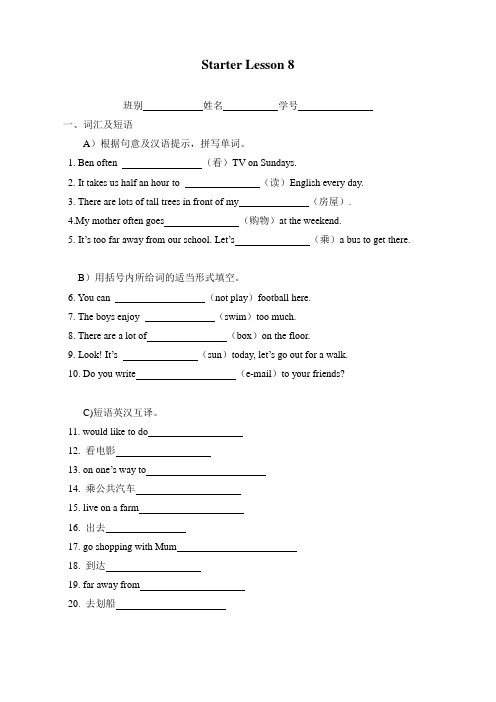
Starter Lesson 8班别姓名学号一、词汇及短语A)根据句意及汉语提示,拼写单词。
1. Ben often (看)TV on Sundays.2. It takes us half an hour to (读)English every day.3. There are lots of tall trees in front of my (房屋).4.My mother often goes (购物)at the weekend.5. It’s too far away from our school. Let’s (乘)a bus to get there.B)用括号内所给词的适当形式填空。
6. You can (not play)football here.7. The boys enjoy (swim)too much.8. There are a lot of (box)on the floor.9. Look! It’s (sun)today, let’s go out for a walk.10. Do you write (e-mail)to your friends?C)短语英汉互译。
11. would like to do12. 看电影13. on one’s way to14. 乘公共汽车15. live on a farm16. 出去17. go shopping with Mum18. 到达19. far away from20. 去划船二、按要求句型转换,每空一词。
1. He often goes home by bus.(改为同义句)He usually .2. Nick doesn’t watch TV on Sunday.(对划线部分提问)Nick on Sunday?3. We read English for half an hour every day.(对划线部分提问)Read English every day.4. Does Daniel often play with you?(做否定回答),.5. Simon doesn’t study very hard.(改为肯定句).二、汉译英,每空一词。
Starter 知识清单(默写版)-2024-2025学年七年级上册
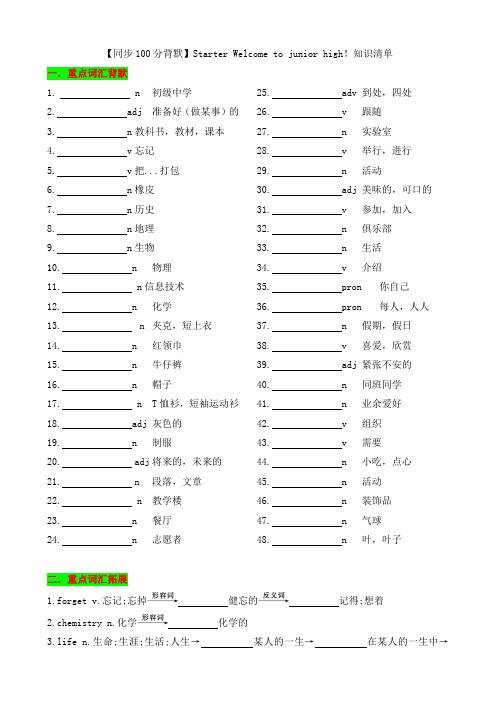
【同步100分背默】Starter Welcome to junior high!知识清单一.重点词汇背默1. n 初级中学2. adj 准备好(做某事)的3. n 教科书,教材,课本4. v 忘记5. v 把...打包6. n 橡皮7. n 历史8. n 地理9. n 生物10. n 物理11. n信息技术12. n 化学13. n 夹克,短上衣14. n 红领巾15. n 牛仔裤16. n 帽子17. n T恤衫,短袖运动衫18. adj 灰色的19. n 制服20. adj 将来的,未来的21. n 段落,文章22. n 教学楼23. n 餐厅24. n 志愿者25. adv 到处,四处26. v 跟随27. n 实验室28. v 举行,进行29. n 活动30. adj 美味的,可口的31. v 参加,加入32. n 俱乐部33. n 生活34. v 介绍35. pron 你自己36. pron 每人,人人37. n 假期,假日38. v 喜爱,欣赏39. adj 紧张不安的40. n 同班同学41. n 业余爱好42. v 组织43. v 需要44. n 小吃,点心45. n 活动46. n 装饰品47. n 气球48. n 叶,叶子二.重点词汇拓展1.forget v.忘记;忘掉健忘的记得;想着2.chemistry n.化学化学的3.life n.生命;生涯;生活;人生→某人的一生→在某人的一生中→挽救某人(的生命)4.you pron.(主格)你;你们你;你们你/你们的你/你们的你/你们自己5.every det.每一个,每个→ pron.每人,人人每人,人人每日的;日常的→ adv.到处6.hobby n.业余爱好,嗜好7.enjoy v.欣赏;享受……之乐趣;喜欢→享受做某事→玩得高兴;过得愉快8.activity活动-- v.行动;表演动作男演员女演员→动作影片积极的9.leaf n.(树、菜等的)叶三.重点短语背默1.On , we have science and computer labs.验室和计算机实验室。
starter_牛津预备课程Unit_1~Unit_8知识教学案 (1)
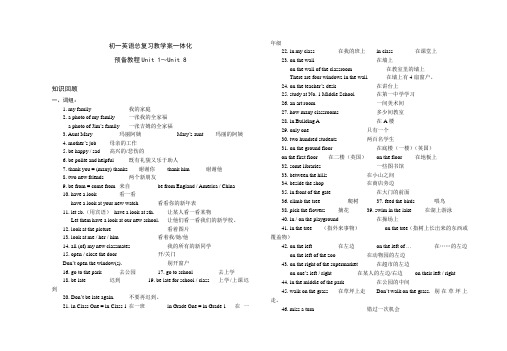
初一英语总复习教学案一体化预备教程Unit 1~Unit 8知识回顾一、词组:1. my family 我的家庭2. a photo of my family 一张我的全家福a photo of Jim’s family 一张吉姆的全家福3. Aunt Mary 玛丽阿姨Mary’s aunt 玛丽的阿姨4. mother’s job 母亲的工作5. be happy / sad 高兴的/悲伤的6. be polite and helpful 既有礼貌又乐于助人7. thank you = (many) thanks 谢谢你thank him 谢谢他8. two new friends 两个新朋友9. be from = come from 来自be from England / America / China10. have a look 看一看have a look at your new watch 看看你的新年表11. let sb.(用宾语)have a look at sth. 让某人看一看某物Let them have a look at our new school. 让他们看一看我们的新学校。
12. look at the picture 看着图片13. look at me / her / him 看着我/她/他14. all (of) my new classmates 我的所有的新同学15. open / close the door 开/关门Don’t open the window(s). 别开窗户16. go to the park 去公园17. go to school 去上学18. be late 迟到19. be late for school / class 上学/上课迟到20. Don’t be late again. 不要再迟到。
21. in Class One = in Class 1 在一班in Grade One = in Grade 1 在一年级22. in my class 在我的班上in class 在课堂上23. on the wall 在墙上on the wall of the classroom 在教室里的墙上There are four windows in the wall. 在墙上有4扇窗户。
牛津译林版初一英语预备课Starter Lesson4练习

Starter Lesson 4班别姓名学号一、根据句意及所给首字母或汉语提示完成单词。
1.She likes her new (裤子).2. The (毛衣)on the bed are my sister’s.3. This blue (外套)is my brother’s.4. Those aren’t my pens. My pens are (绿色的).5. —What’s this? —It’s an (橙色的)cap.6. We are Chinese. Our hair is b .7. These (盒子)are big but light.8. Snow(雪)is (白色的).9. —Whose pens are they? —They are (他的)pens.10. —Are (那些)their bikes? —Yes, they are.二、单项选择()1. —What’s in the pencil box? — A pen in it.A.That’sB. There’sC. ItD. This’s()2. Mr shoes are .A.green; greenB. Green; GeenC.Green’s; greenD. green’s; green ()3. —What color is that coat? —.A.It’s an orange.B. It’s orange coat.C. It’s orangeD. It’s a orange. ()4. —Is car white ? —Yes, it’s white car.A.the; aB. a; theC. a; aD. the; /()5. —What color your trousers? —black.A.is; It’sB. are; It’sC. are; They’reD. is; They’re()6. —Where Peter’s shoes? —shoes are under the bed.A.are; She’sB. is; HerC. are; He’sD. are; His()7. —What are these? —are Miss Zhang’s tapes.A.ThoseB. ItC. TheyD. Their()8.—Are those your books? —No, aren’t.A.thoseB. theyC. theseD. it()9. —Is this your orange coat? —Yes, is.A.itB. thisC. thatD. its()10. —Is that his father’s hat? —No, isn’t.A.itB. thisC. thatD. its三、根据所给汉语提示填空。
最新整理牛津初中英语预备课程Starter完整课时练习汇总
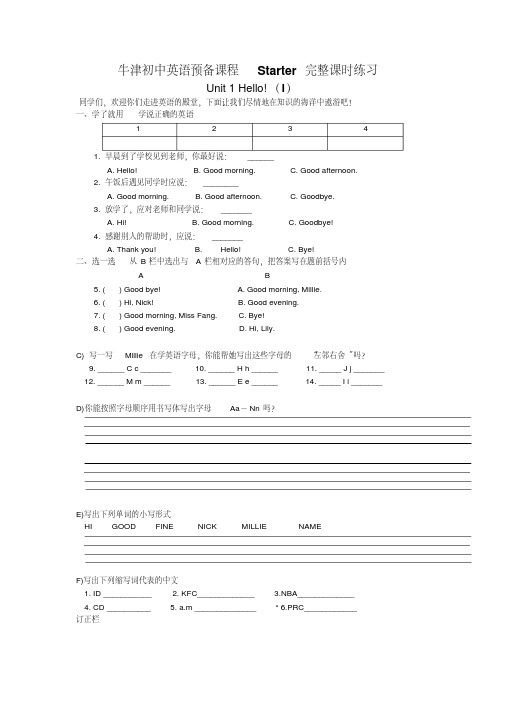
特点,我们要善于观察和把握。
3.勤动笔。把教师的重点及时迅速记在课堂记录本上,不过要处理好听课和记笔记的关 系,不能顾此失彼。
4.多开口。对于自己课堂不清楚的地方,下课后一定要及时询问老师,把问题解决在当 天,不要顾及所谓的面子而不懂装懂,否则漏洞越来越多,最后造成英语成绩的不断滑坡。
很多同学反映,明明已经把单词全部背过来了,结果老师提问时又忘记了。这说明我们 的复习没有计划性和周期性。我们每天回到家后要做的事情可以归结为三个方面:听、读、
D .Millie D .This is Nick
4. _________ is the fifth( 第五 ) letter.
A .B
B .G
C .E
D. M
5. —__________? — Nick. A. What ’ s your name C. You ’ re Nick, right?
2. 午饭后遇见同学时应说: ________
A. Good morning.
B. Good afternoon.
C. Goodbye.
3. 放学了,应对老师和同学说: _______
A. Hi!
B. Good morning.
C. Goodbye!
4. 感谢别人的帮助时,应说: _______
A. Thank you!
2. KFC_____________
4. CD __________ 5. a.m ______________
订正栏
3.NBA_____________ * 6.PRC____________
二、课外阅读
怎样学好初中英语
对初中生而言, 英语是难度较大的学科, 掌握英语学习的方法, 使自己能独立获取知识,
StartersUnit1-3知识点归纳与练习(含答案)
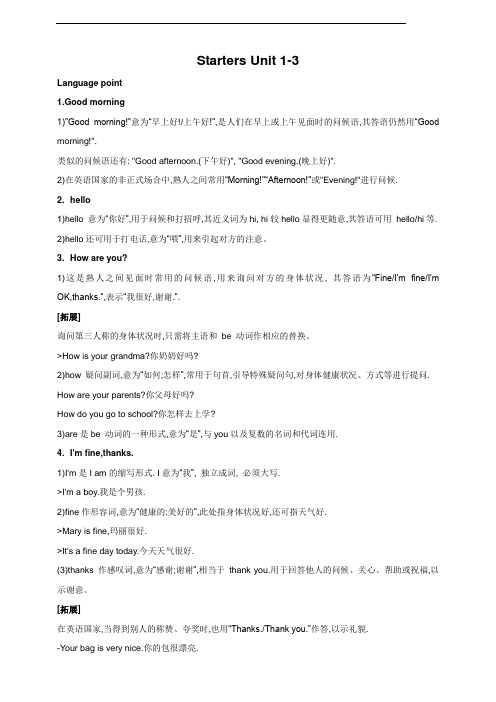
Starters Unit 1-3Language point1.Good morning1)"Good morning!”意为“早上好!/上午好!”,是人们在早上或上午见面时的问候语,其答语仍然用“Good morning!".类似的问候语还有: "Good afternoon.(下午好)", "Good evening.(晚上好)".2)在英语国家的非正式场合中,熟人之间常用“Morning!"“Afternoon!"或"Evening!"进行问候.2. hello1)hello 意为“你好”,用于问候和打招呼,其近义词为hi, hi较hello显得更随意,其答语可用hello/hi等.2)hello还可用于打电话,意为“喂”,用来引起对方的注意。
3. How are you?1)这是熟人之间见面时常用的问候语,用来询问对方的身体状况, 其答语为“Fine/I'm fine/I'm OK,thanks.”,表示“我很好,谢谢.”.[拓展]询问第三人称的身体状况时,只需将主语和be 动词作相应的替换。
>How is your grandma?你奶奶好吗?2)how 疑问副词,意为“如何;怎样”,常用于句首,引导特殊疑问句,对身体健康状况、方式等进行提问. How are your parents?你父母好吗?How do you go to school?你怎样去上学?3)are是be 动词的一种形式,意为“是”,与you以及复数的名词和代词连用.4. I'm fine,thanks.1)I'm是I am的缩写形式. I意为“我”, 独立成词, 必须大写.>I'm a boy.我是个男孩.2)fine作形容词,意为“健康的:美好的”,此处指身体状况好,还可指天气好.>Mary is fine,玛丽很好.>It's a fine day today.今天天气很好.(3)thanks 作感叹词,意为“感谢;谢谢”,相当于thank you.用于回答他人的问候、关心、帮助或祝福,以示谢意。
牛津译林版初一英语预备课StarterLesson3练习

牛津译林版初一英语预备课StarterLesson3练习Starter Lesson 3班别姓名学号一、把下列词组译成英语。
1. 起立2. 请坐3. 看黑板4. 跟我读5. 一间美术室6. 打开你们的书7. 翻到第四十页8. 听磁带9. 十三张课桌10. 一张中国地图二、依据句意和所给词或首字母提示完成句子。
1.Please (write)down your name on the paper.2. Don’t (listen)to music again, it’s time for class.3. There is a (read)room in our school, we often read books in it.4. Please (wash)your hands before you have supper.5. There is a ball on the (地板).6. There are two (computer)rooms in our school,7. Are there any (fan)in the room?8. I (学习)at Yucai Middle School, it’s a nice school.9. (欢迎)to our class.10. Don’t be late for school (再一次).11. The traffic (灯)is green, we can cross the road now.12. Do you know the (答案)to the question(问题)?13. It’s cool, please (关)the window.14. My bedroom is not big, but it’s(干净)and nice.15. His school bag is on the (椅子)。
16. How many (library)are there in the city?17. Some (woman)like traditional(传统的)clothes.18. Please (not open)your books.19. What’s on the (teacher)desk?20. There are thirty students in (Sally)class.三、用have,has, there be适当形式完成下列句子。
七上英语Starter Unit1-3知识点总结及练习
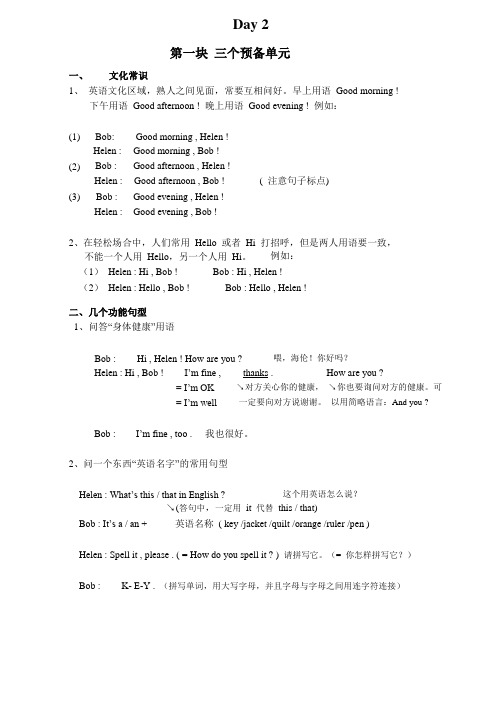
Day 2第一块三个预备单元一、文化常识1、英语文化区域,熟人之间见面,常要互相问好。
早上用语Good morning !下午用语Good afternoon ! 晚上用语Good evening ! 例如:(1)(2) Bob:Helen :Bob :Good morning , Helen !Good morning , Bob !Good afternoon , Helen !Helen : Good afternoon , Bob ! ( 注意句子标点)(3) Bob :Helen : Good evening , Helen ! Good evening , Bob !2、在轻松场合中,人们常用Hello 或者Hi 打招呼,但是两人用语要一致,不能一个人用Hello,另一个人用Hi。
例如:(1)Helen : Hi , Bob !(2)Helen : Hello , Bob !二、几个功能句型1、问答“身体健康”用语Bob : Hi , Helen !Bob : Hello , Helen !Bob : Hi , Helen ! How are you ? 喂,海伦!你好吗?Helen : Hi , Bob ! I’m fine ,thanks . How are you ?= I’m OK = I’m well ↘对方关心你的健康,↘你也要询问对方的健康。
可一定要向对方说谢谢。
以用简略语言:And you ?Bob : I’m fine , too .我也很好。
2、问一个东西“英语名字”的常用句型Helen : What’s this / that in English ?这个用英语怎么说?↘(答句中,一定用it代替this / that)Bob : It’s a / an +英语名称( key /jacket /quilt /orange /ruler /pen )Helen : Spell it , please . ( = How do you spell it ? )请拼写它。
译林版七年级starter各单元重点语法讲解

译林版七年级starter各单元重点语法讲解第一课时:名词单复数讲解及练习一、名词可以分为可数名词和不可数名词,不可数名词没有单复数,一律看作单数。
问:可数名词的单数前什么时候用a,什么时候用an?答:以元音音标(或音素)开头的用an。
以辅音音标(或音素)开头的用a。
注意:我们看的是音标(或音素),而不是元音字母。
练习选择a或an或不填(用/表示)1. pen2. _ bag3. apple4. big apple5. banana6. orange7. oranges8. orange pen一、写出下列各词的复数I ____this ______that____watch _______child _______photo ________diary _________ day________ foot_______ book_______ dress _______tooth______ sheep _____box______ thief _______ peach______ sandwich ________man______ woman_______二、翻译词组及完成句子。
1、18张课桌_______2、13张图画________3、15块橡皮_______4、20个学生_______5、3座教学楼_______6、两座图书馆______7、一个餐厅________ 8、4间阅览室_______ 9、7个铅笔盒_______10、-How many _______(篮球场)are there in your school?-There are two_____(篮球场)and a____(足球场)in it.11、There isn’t a(图书馆)______but there are some_______(电脑室).12、-Are there any (美术教室) _______in your school?-Yes,there is an ________(美术教室)注意be 动词遇到名词时的运用: 单数名词用is, 复数名词全用are.1. __________ is my aunt. We often visit __________. ( she )2. China is a developing country. _________is in the east of Asia. ( its )3. What day is __________ today? — __________ is Thursday. (its)5. I own a blue bike. The red one isn’t __________. ( I )6. These new houses are so nice. __________ are very expensive.( them )7. The fishermen caught a lot of fish, didn’t __________? ( them )8. Ling Ling is a girl. ____ studies in a primary school. ______ brother lives with____ and helps ____ with______ lessons. ( she )9. Mike is my classmate. ____ is good at Engliush . ( his )10. Kate wants a glass of milk. Will you pass it to ____ ? ( she )11. What’s the weather like today ? ____ is cloudy. ( its )二、用形容词性物主代词和名词性物主代词填空1. I ate all ____ sandwiches yesterday.( I ) Can I have one of ____ ? ( you )2. George has lost ____ ( his ) pen. Ask Mary if(是否)she will lend him ____ . ( she )3.. Jack has a dog and so have I. ____ ( he ) dog and ____ ( I ) had a fight (打架).4. The teacher wants you to return that book of ____ ( he )5. Mr. and Mrs. Green and a friend of ____ are coming to see us. ( they )6. We are going to Paris to stay with a French friend of ____ . (we )三、用适当的人称代词和物主代词填空A. 从括号内选择正确的代词填空1. Your football clothes are on the desk.Please put _________(they,them,their,theirs) away.2. (We,Us,Our,Ours)_________ English teacher is Mrs. Green.We all like _________(she,her,hers).3. (I,Me,My,Mine)_________ can’t get my kite.Could you help _________(I,me,my,mine)?4. Tom can’t get down from the tree.Can you help _________(he,him,his)?6. We can’t find our bikes.Can you help _________(we,us,our,ours)?5. These are _________(he,him,his) planes.The white ones are _________(I,me,mine).B. 填入正确的人称代词和物主代词1. This isn’t________knife. _________ is green. ( she )2. These are your books,Kate. Put __________ in the desk,please. (they )3. _______ must look after ________ things. ( you )4. Wei Fang,is that ________ ruler? Yes,it’s.( you )5. They want a football. Give __________ the green one,please. ( they)6. It’s Lin Tao’s bag. Give it to __________. ( he )7. Is this pencil-box Li Lei’s? No,___________ is very new. ( he )8. This box is too heavy. I can’t carry _________. ( it )Don’t worry,Let __________( I ) help __________. ( you)9. _____ is a boy _____ name is Mike. Mike’s friends like _____ very much. ( he )10. My sister is in _____ room. _____ is a teacher. ( she )11. Jane is a little girl. _____ mother is a nurse. ( she )12. We are in _____ classroom. _____ classroom is big. ( we)13. My father and mother are teachers. _____ are busy ( them)14. You are a pupil. Is _____ brother a pupil, too? ( you )四、用括号中的适当形式填空(1)-Are these ________(you)pencils?-Yes, they are ________(our).(2)—Whose is this pencil?—It’s ________(I).(3)I love ________(they)very much.(4)She is________(I)classmate.(5)Miss Li often looks after________(she)brother.(6)—Are these ________they)bags ?—No, they aren’t _____(their). They are ________(we).五、根据句意用适当的人称代词、物主代词填空:1. Mary works in a book store. _____ likes ______work very much.2. John and I are in the same school. ______ go to school together.3. Everybody likes that sport, do ______?4. She is a friend of _______ . We got to know each other two years ago.5. Her sister makes all ______ own dresses.6. I have many friends. Some of_______are good at English.7. May I use ______ bike? ______is broken.六、选择填空1. Who’s singing over there ? — ________ is Sandy’s sister.A. ThatB. ItC. SheD. This2. ________ will spend the summer holiday in Hawaii.A. She, you and IB. You, she and IC. I, you and sheD. Her, me and you3. Between you and ________, he is not a real friend.A. meB. IC. heD. his4. My uncle bought a new bike for ________.A. theirsB. theyC. meD. I6. Here’s a postcard for you, Jim! — Oh, ________ is from my friend, Mary.A. heB. itC. sheD. it’s8. Little Baby knows that he should not take the things that do not belong to ________.A. heB. hisC. herD. him9. Will anyone go on a trip with him ? — Not ________.A. IB. meC. mineD. he10. Among those lovely toys, the brown toy dog was given by ________.A. heB. hisC. himD. he’s第三课时:There be结构及用法1.There be+名词+地点,表示某处有某物,某人,某事,there是引导词,无实义,具体有3种句子结构:There is +可数名词单数+地点e.g.There is an apple on the desk.There is +不可数名词+地点 e.g.There is some water in the cup.There are+可数名词复数+地点e.g.There are two cats behind the door.其否定形式是直接在be动词后加not, e.g. There isn’t an apple on the desk.一般疑问句是把be动词提前e.g. Is there an apple on the desk?肯定回是Yes,there is. 否定回答是No,there isn’t.2.There be结构的就近一致原则:be动词的形式取决于紧挨着be的名词的形式。
- 1、下载文档前请自行甄别文档内容的完整性,平台不提供额外的编辑、内容补充、找答案等附加服务。
- 2、"仅部分预览"的文档,不可在线预览部分如存在完整性等问题,可反馈申请退款(可完整预览的文档不适用该条件!)。
- 3、如文档侵犯您的权益,请联系客服反馈,我们会尽快为您处理(人工客服工作时间:9:00-18:30)。
7A Starter 复习
一、词组积累
1.我的双胞胎兄弟(姐妹)my twin brother/sister
2.我的全家福照片a photo of my family
3.十位女警察ten policewomen
4.十二位女医生twelve women doctors
5.他父亲的工作his father's job
6.有礼貌且乐于助人be polite and helpful
7.来自美国be/come from America 8.让我看一看Let me have a look.
9.开门/关门open/close the door 10. 起立/坐下stand up/sit down
11.别再迟到Don't be late again. 12. 游泳池a swimming pool 13.办公室an office 14.两百个学生two hundred students
15.学生中的两百个two hundred of the students 16.几百个学生hundreds of students
17.在第一层on the ground/first floor 18.多少图书馆how many libraries
19.真棒That's great. 20. 在他和我之间between him and me
二、单词词性,了解基本用法:
冠词a /an /the a banana an elephant the Moon
名词(n)(单数/复数/不可数) my cousin two children some chicken
形容词(adj)be angry /be busy doing sth /be cloudy /a beautiful girl /be afraid be fine be ill in hospital be hungry be late for…
feel healthy look good/nice an interesting film
副词(adv)get up early be really far (away) from …
get here/there/home
介词(prep)in autumn in the afternoon on a cold evening
between …and…
by bike= on the bicycle by car=in the car behind me
beside the cinema at school on foot on the left/right of
come from=be from on the farm in the tree on the tree
at night near the kitchen
be (is, am,are) (系动词) be +n I am a student .
be +adj She is clever.
be+介词短语His mother is in hospital.
行为动词(v)ask/answer questions play basketball begin to do call sb buy sb sth =buy sth for sb close the door clean the classroom
bring here/me (带来)(越来越近)take there (拿走)(越来越远)
fly kites get to school go to hospital have lunch have noodles
give sb sth =give sth to sb jump high/far like /love doing
help…with… help me with my English let sb do sth
let us play football. listen to music look at the picture
代词(pron)any +单数任何一个they them their theirs
一词多词性cold on a cold evening have a cold
early catch the early bus get up early
exercise do morning exercises take exercise
Mum exercises every day.
clean clean the classroom keep clean
练习
一、按要求写出单词:
baby (复数)____________ box(复数)_______________ boy(复数)______________ bus(复数)_____________buy(三单式)______________ candy(复数)_____________ sweet(复数)_____________child(复数)____________Chinese(复数)_____________ city(复数)_____________ eat(三单式)____________ dress(复数)_____________ cry(三单式)____________(现在分词)_____________family(复数)______________
二、词型转换:
1.How many _________ (candy) are there in your hand ?
2.We have four ________ (class) in the morning .
3.Don’t forget to _________ (take) your homework here.
4.Lucy and I _________ (be) good friends.
5.There _________ (be) some bread and two cakes in the fridge.
6.Hi, Nick. Here ________ (be) your new clothes.
7.We are all __________ (Chinese).
8.A lot of _________ (boy) are on the playground.
9.Who often _______ (buy) birthday presents for you ?
10.My mother is busy _________ (clean) the house.
11.It’s ____________ (困难的) for us to answer this question .
12.Look at those ________ (baby) clothes ,they are new and clean.
13.He likes _______ (listen) to the music very much.
三、单项选择
( )1. It's time_________________.
A. go to school
B. play games
C. to go home
D.to do my homeworks ( )2. ______go and help her.
A. Let's me
B. Let's us
C. Let's
D.Let's to
( )3. He often _________supper at 6:00 in the evening.
A. have
B. has
C. is having
D. is eating
( )4. Where _____he _____from?
A. is, come
B. do, come
C. does, come
D. is , from
( ) 5. Do you go to school _____ seven thirty ?
A. at
B. in
C. on
D. every
( ) 6. Do you like your school ? _________.
A. I like .
B. Yes, I am.
C. Yes, I do.
D. No, I do
( ) 7. The students study _____ school _____ Monday to Friday .
A. in; on
B. at; from
C. in; at
D. from, to
( ) 8. - Your mother ______ very young. - Thank you.
A: looks at B. looks C. looks like D. look
( ) 9.There is ______ “s” and _______ “u” in the word “use”.
A. a; a
B. a; an
C. an; a
D. an; an
( )10. It’s going to rain. You should _______ an umbrella with you.
LOGO - [八六班LTGZZZX]
A. bring
B. take
C. use
D. put
[人教版八年级下册地理复第五章中国的地理差异
第六章北方地区
第七章南方地区
第八章西北地区
第九章青藏地区
第十章中国在世界中。
